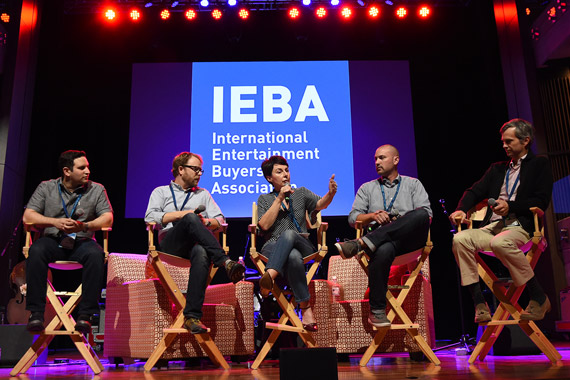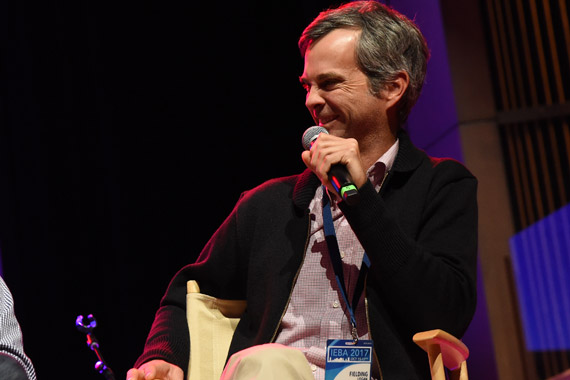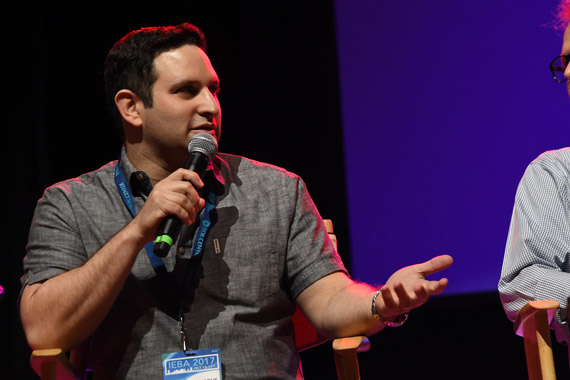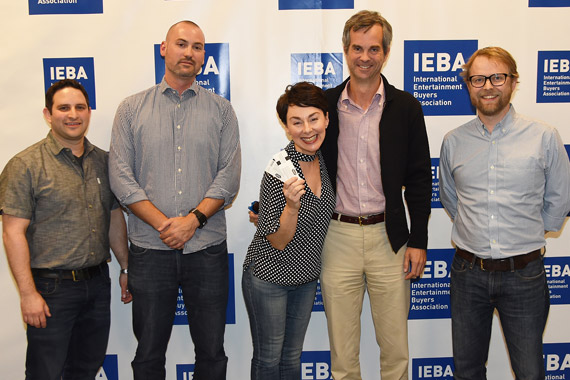

Pictured (L-R): Charlie Goldstone, Jason Comfort, Pam Matthews, Justin Atkins, Fielding Logan. Photo: IEBA
On the final day of IEBA 2017 (Oct. 17), Executive Director Pam Matthews moderated an intelligent panel on the hot-button subject of concert ticketing, featuring Fielding Logan (Q Prime South – Nashville, TN), Justin Atkins (Ticketmaster On Tour – Nashville, TN), Jason Comfort (Red Light Management, Ticketing – Charlottesville, VA) and Charlie Goldstone (Frank Productions Concerts – Madison, WI).
Buckle up.
“The way we sell tickets is broken,” declared Mathews of an artist’s ticketing dillema. “[As a fan] I am doing other stuff at 10 a.m. on a Saturday [when tickets go up for sale]. I know I’m screwed so I’m going to [secondary ticket site] StubHub.”
Fans, though are still willing to pay a premium for re-sold concert tickets (on sites like Stubhub) for the simplicity of their buying experiences. Many fans do not realize by shopping at secondary sites:
A) They are paying a premium for seats purchased by bots and scalpers
B) The artist themselves does not see any of the money paid above face-value, and in many cases may be losing money from an unsold primary [g.e. Ticketmaster] ticket purchase
C) The ticket may be fraudulent

Fielding Logan. Photo: IEBA
“A lot of fans don’t bother shopping at primary sellers because it’s easier and engrained from marketing or habit,” said Comfort about the attractiveness of the secondary market. “Millennials and younger just see if they can afford the prices on StubHub [and either go or don’t go]. I think that’s a really easy experience for them. But I think the artist should be participating in that revenue.”
Artists are sensitive to ticket prices they present to fans. Historically artists price below market value. This denial, cloaked in protectionism, has fueled the billion-dollar secondary ticketing market, where the same fans the artists are trying to protect still end up paying premiums for seats. So for the sake of public perception, the artist misses out on revenue underpriced tickets.
Artist managers Comfort and Logan agree: artists are often have to be dragged, kicking and screaming to raise their ticket prices.
“If the artist is the one that is impeding the process thinking their image takes a hit then lets shift blame and focus to something else, like [say the distributer] Ticketmaster, and say: ‘This is how the distribution system works,'” said Matthews, who also notes part of the problem is the ticketing business model, which rewards speed.
“My dad sells groceries, he doesn’t sell all his corn at 10 a.m. on Saturday,” she analogized.

Jason Comfort. Photo: IEBA
“If we’re pricing effective, we slow down the pace of ticket sales tremendously, which would scare a promoter, who has skin in the game,” said Comfort.
Matthews countered the argument: “I wouldn’t be scared. If I felt good about buying the act and felt good at an agreed price, then let’s sell it the right way.”
“Then how do you feel if that last ticket is sold as the artist is walking on stage?” asked Atkins. “It’s two different mentalities and what is comfortable for you. Pricing is not just a monetary decision, it’s a creative, brand decision—what the artist feels the price should be for the art they are conveying.”
“I heard [Live Nation CEO] Michael Rapino say, ‘It’s insane that after a show sells out, we basically close shop for eight months while other people control the market,'” said Logan. “If we got our ticket prices right—rather than having them grossly underpriced—then we don’t really care about changing arcane laws or if someone is re-selling their ticket. But if you’re going to sell something worth $100 for $20, you have to have strings attached, like having it be non-transferable.
“You think about sitting court-side at [basketball games] and you’ll pay any amount of money. Fans do pay any amount of money on the secondary market, so why are we embarrassed?” Logan, continued, while highlighting the contrary. “But Eric Church is somebody who doesn’t just want to have rich people around the stage and in the pit. So there has to be some sort of hybrid [solution].”
“The problem is when you have an artist who wants to blow-out a show—sell out quickly—to tell a story,” Goldstone said of PR stunts. “It doesn’t matter to me as a promoter either way, if we sell out in a minute or, say eight months.”
“Our job,” Matthews reinforced, “is to get fans closer to artists. And the distribution system got hacked.”

Charlie Goldstone. Photo: IEBA
To that point, Goldstone replied, “We can have all the technology we want, but if we’re selling tickets under their real value, the technology will always catch up because there’s so much money in the secondary market. So how do we fix the systemic problem rather than these stop-gap measures to stop scalpers?”
The downside to more accurate ticket pricing, creating a slower roll-out, would require an ego-check for artists, says Matthews, “You’ve got to get that ego out of the way so that you don’t buy that sold-out, full-page ad even before you go on sale.”
Logan noted, sometimes fans are confused when they hear “sold-out” because there are secondary sites where you can always find tickets.
“There’s no such thing as a sell-out,” affirmed Matthews. “Somebody’s got tickets in their back pocket they’re gonna hold out and sell them for eight times face value.”
“Artists need to understand that they can participate in some of that revenue by pricing things perhaps more correctly,” noted Comfort.
Enter Taylor Swift, who notably received flack for offering preferred concert ticket access with album pre-orders. The panel dreamed of streamlining that same process and “data” with their own artists.
“Ticketmaster, with Verified Fan, has all this information we need to use to reward the people that are coming in the first place—to get them to come back and take chances on things they wouldn’t normally do,” said Goldstone. “Venues and promoters need to remember they are in the hospitality business for patrons. I want to offer incentives and upgrades to people who come regularly. We just need information from ticketing technology companies to make that easier.”
Comfort agreed. “If you had a loyalty program where you could look at people’s history for superfans who saw the artist through the years, you know they will use the ticket, so make sure they get a really good seat at a fair price. All it would take is a really good engine that has all the data (records, merch, Spotify listens, etc.) but the power could be quite profound.”

Justin Atkins. Photo: IEBA
“That would require identity, being able to identify fans to reward them,” noted Atkins of Goldstone’s comments. “We created Verified Fan, a pre-registration process to remove the scalpers and bots to see who the fans are—who is likely to go to the show, and give them access to the invitation-based on-sale. Then we could see demand, perhaps opportunity to add another show, etc.”
So are we okay with the face value of tickets being a wholesale price, like Costco? The bottom line is artists are getting the price they ask for with face value (aside from when fans forgo unsold tickets to shop at secondary).
“Big guys can do big things because they’ve got big money to do it,” Matthews concluded. “It takes the business to say, ‘This is how we’re going to do it now.’ Who’s ready to kick the can over? Are we there yet?”
“It took 15 years after Napster,” warned Logan. “Hopefully it’s not going to take 15 years to get to this future ticket market place.”
As the industry is squeezed evermore, the question is: Does the artist want to participate in the billions of dollars they have left on the table from their own fans for their own concerts?

Pictured (L-R): Charlie Goldstone, Justin Atkins, Pam Matthews, Fielding Logan, Jason Comfort. Photo: IEBA

About the Author
Eric T. Parker oversees operations and contributes editorial for MusicRow's print magazine, MusicRow.com, the RowFax tip sheet and the MusicRow CountryBreakout chart. He also facilitates annual events for the enterprise, including MusicRow Awards, CountryBreakout Awards and the Rising Women on the Row. eparker@musicrow.com | @EricTParkerView Author Profile


